Peter MALONE
Saturday, 18 September 2021 19:47
Ain't Them Bodies Saints
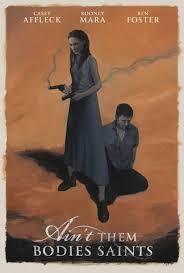
AIN’T THEM BODIES SAINTS
US, 2013, 96 minutes, Colour.
Casey Affleck, Rooney Mara, Ben Foster, Keith Carradine, Nate Parker.
Directed by David Lowery.
That’s quite a question in the title. But whether it is answered is a moot question. The first inclination is to say that the bodies are not saints. This is a film where there are quite a number of bodies, in the context of crime, prison escapes, vengeance.
The film announces that this is a Texas story. The picture of Texas is almost like that of painting, vistas of open fields, sometimes drab landscapes, nothing special. And, maybe, this is the kind of context for the central characters, drab in their way, seemingly nothing special. We are introduced to them as Ruth (Rooney Mara) walks away from home and from her husband, Bob (Casey Affleck). He pleads with her and they go home. She is pregnant. However, they have little time to settle back home when there is a police siege and some shootings, the upshot being Bob sentenced to prison.
The years pass. Ruth’s daughter, Silvie, is now a little girl. She and her mother live in a house provided by Bob’s father (Keith Caradine) who runs a local store. She also receives the attention of one of the local police, Patrick (Ben Foster). But she keeps her mind on Bob, hoping against hope.
Then Bob is able to escape from prison, describing the experience in somewhat mystical terms to his friend, Sweetie (Nate Parker). He is able to dig up money from past robberies and wants to find Ruth and settle down with her and his daughter. Needless to say, this is not going to happen. The mood is pensive and the audience senses that the film is something of an elegy.
The climax comes with a group seeking vengeance on Bob, some shootings, and Ruth left bereft. Perhaps the audience feels a little of the same as this is a film which is character-driven, but also dialogue-driven, with plenty of silences as well, so that while there is some action, there is an overall sombre and reflective tone. One of the regrets is that Casey Affleck has a somewhat inarticulate way of speaking his lines which means that many of them are muffled and the audience does not really know what he is saying.
The film, with its title which, on reflection, sounds more than a little pretentious, aspires to be something of a Texas classic, in the tradition of the early films of, say, Terence Malick.
1. The title? The references? The meaning? The central characters?
2. A Texas story, the open spaces, the towns, shops, homes? The atmosphere of this part of Texas? The overtones of paintings?
3. The musical score, the range of music, the moods, as background to the characters and actions?
4. The screenplay, the emphasis on dialogue, discussion, meanings?
5. The opening, Ruth walking away, Bob and his pursuit, the relationship between the two, her exasperation, his desperation? Back in the house? Their life? The background, the robberies, the buried money? Revealing her pregnancy? the build-up to the shootout? Ruth firing, Patrick and his being injured? The police firing, the death of the brother inside? The decision to go out, the police taking them, Bob and his going to prison?
6. Ruth, with Bob’s father, his giving her the house, the birth of her daughter, with Sylvie and the years passing, her awareness of Bob, Patrick and his continued support and love?
7. Patrick, his place in the police, being shot, his visits, the attachment to Ruth, to Sylvie, his support and love? His continued protection?
8. Bob’s father, the loss of his sons, his embracing Bob, not seeing him for the future, his work in the shop, the visitors and their discussions of the gun, his sitting on the porch, his being shot, Patrick with him as he died?
9. Bob, the scenes in prison, his escape, his explanation, the mystical overtones and his walking out of the prison? The discussions with Sweetie, digging up the money, giving him cash? Sweetie sheltering him? Patrick and the search of the premises, the fragment of the photo, Bob escaping out the window?
10. The men pursuing Bob? Shooting his father? Shooting into the house, Bob and his being wounded? Going to Ruth, their talk, her listening? His death? Sylvie and Patrick, the future and dreams?
11. The film as mixture of action and meditation? A Texas story, American story, Moody story, perspectives on human nature?
Published in Movie Reviews
Published in
Movie Reviews
Tagged under
Saturday, 18 September 2021 19:47
Mystery Road
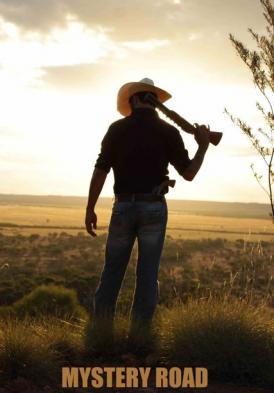
MYSTERY ROAD
Australia, 2013, 116 minutes, Colour.
Aaron Peterson, Hugo Weaving, Jack Thompson, Ryan Kwanten, David Field, Bruce Spence, Roy Billing, Tasma Walton, Tony Barry, Zoe Carides, Damian Walshe- Howling, Robert Mammone.
Directed by Ivan Sen.
One of the best Australian films of 2013 It works in the genre of police investigation, murders, mystery in the context of an outback Australian town.
It is the work of writer-director, Ivan Sen, who made impact with such films as Beneath Clouds and Toomelah. It is set in an outback town of north-western New South Wales and draws on Sen’s experience of this environment. He also comes from an aboriginal background, using this in his previous films, and making it quite central to Mystery Road.
Sen not only writes his screenplay and directs his film but is director of photography, editor and composer of the musical score. With Mystery Road, he has brought all these talents together most successfully.
Aaron Pedersen proves himself to be an imposing screen presence as Jay, the local man who made a mess of his marriage with his drinking, and his wife drinking, and abandoning them to go to Sydney where he trained to be a detective. He has now returned and is involved in the investigation of a dead aboriginal girl. He himself is aboriginal.
Jay is rather taciturn, has something to prove, wants to re-unite with his daughter but finds her unwilling and his wife still bitter and drinking. The local police chief relies on him but does not involve himself personally in the case. Which leaves the onus on Jay to uncover clues, to interview people, to do some surveillance. He uses his powers of observation and his wits as well as a spirit of independence to uncover what is happening in the town, prostitution for the drivers of the road trains, the girls becoming addicts as well as being suppliers of drugs.
While the plot has its ugly dimensions, the photography of the town and its surroundings, a blend of contemplative longshots as well as probing close-ups, contribute to the atmosphere. And, the story is interspersed with a number of aerial shots, looking down on the town itself, the houses, the streets and the vehicles moving along them.
Pedersen leads a strong cast, peopled with a number of Australian character actors. Hugo Weaving is an enigmatic fellow officer. An almost unrecognisable Jack Thompson is an old codger who gives information to the police. Roy Billings is the owner of a gun shop. Bruce Spence is the coroner. David Field is the local landowner with Ryan Kwanten as his son. Robert Mammone is the police partner. Tasma Walton is Mary, Jay’s wife.
This means that the film is interesting and entertaining in its genre, but also offers insight into the Australian character. And all this in the unusual beauty as well as some squalid human conditions. The film was shot in Winton, Queensland.
1. The critical acclaim for the film? Ivan Sen and his Australian themes, aboriginal themes, drawing on his own background and upbringing in country Australia? The praise for the film within its police and mystery genre?
2. The location photography, the Queensland town of Winton, the outback, the town itself, small, the surroundings and the broad paddocks, the mountains, the touches of desert? The town, streets, homes, the Chinese restaurant, the police precincts? The musical score? The work of Ivan Sen as director, editor, composer, writer?
3. The pacing, the editing, the long longshots, the close-ups on people, the aerial photography of the town and its streets? The photography and it realism? Classic style?
4. The film and the attention to dramatic and visual detail, the trucks on the road trains, the scenery, the focus on guns, the many sequences of children playing, asking questions, with the gun…?
5. The title, the visual, focus, the introduction of the road trains, the driver stopping, his tyres, the sound of the dog, searching in the night, the pipes and finding the dead girl? The setting up of the best story?
6. Jay, his arrival, a big man, his authority, with the police, interactions with the other police, his partner and his disdain? The arrival of the coroner, discussions with Jim? The police chief, the personal relationship with him, orders? Saying that he did not have enough men, putting Jay in charge?
7. Jay, his past, his marriage to Mary, their daughter, both of them drinking, his leaving, going to Sydney, training as a detective, the decision to return home, his work with the police?
8. The details of his investigation, his untrustworthy partner, the impositions of the chief, watching from the car, in his office? The phone calls and the information from Jim about the dead girl, forensic evidence? The situation of the girls, the truckies, the girls going out to meet them, the sexual background, drugs, missing girls? Jay and his daughter, her mobile phone and the indication of calls?
9. His visit to Mary, her bitterness, drinking, his daughter going out to talk with him, sitting with him, his inviting her to live with him? Mary at the pokies, her daughter missing? Going to the house, it’s being trashed? The search for the drugs? Mary’s fear?
10. The dog, the testimony, Jay going out to visit the old man who had made the report, their talk together, the information?
11. Jay and his getting the gun, the discussions with the shop owner, his going out into the fields, the bottles and hits, the accuracy of his shooting? Preparing for the later episode in the hills?
12. Bailey and his son, the visit, ownership of the land, the surly response, Jay watching, the huge shed, the lab for the drugs, the men exiting with protective clothes?
13. The picture of the town, the picture of the town’s people, their talk, Jay and is getting information, at the shops, restaurants, the man next door and his watching, nodding the truth to Jay?
14. Hugo, his work as a policeman, enigmatic, his attitudes towards Jay, their discussions?
15. The aborigines in the town, their presence, the girls, the modern situations, mobile phones, friends? Yet the background of sexual promiscuity, drugs?
16. Wayne, cheeky, his attitude towards Jay, being arrested, the interviews, the information, Hugo coming in, taking him? He is being abducted by the drug manufacturers? His being killed?
17. Hugo, not wanting Jay to hinder his case, his connections, informants, going to the restaurant, the talk? Jay and his suspicions?
18. Jay going to the house, the television set, finding the drugs? Making the contact, to return the drugs? To get his daughter back?
19. Going into the hills, Jay watching, the drivers, the killing of the young man, the wearing of the masks, the exchange of the drugs, the guns and the shooting, Hugo in the hills and is telescopic rifle, shooting and saving Jay, Jay as a target, his ability with his rifle, the death of the drug dealers? Identifying them? Removing the mask and finding his partner? Hugo and his being killed?
20. The cross-section of the town? Drugs on the 21st century, the destructive power of the drugs?
21. Jay going home, his daughter, Mary, the daughter acknowledging the truth? Possibilities for future?
22. The perspective on Australian country towns and characters, drugs and prostitution, violence, aborigines? The town in the 21st century?
Published in Movie Reviews
Published in
Movie Reviews
Tagged under
Saturday, 18 September 2021 19:47
Austenland
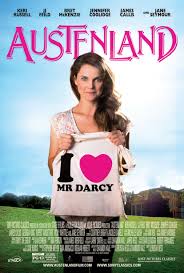
AUSTENLAND
UK, 2013, 97 minutes, Colour.
Keri Russell, JJ Feild, Jennifer Coolidge, Jane Seymour, Bret Mc Kenzie, James Callis, Georgia King, Ricky Whittle.
Directed by Jerusha Hess.
2013 sees the bicentenary of the publication of Jane Austen’s Pride and Prejudice, one of the great classic novels. However, Jane Austen, with her acute observation of daily life in the Regency period, was not without a satirical eye and a wry comment. Would she have approved of Austenland? Perhaps a bit too broad in its comedy for her general taste, but she may have made allowances for the eccentricities of the Americans coming to England as well as the pretensions of some of her fellow-countrymen and countrywomen.
Austenland is not an exploration of Jane Austen’s novels but a bit of a visit to her world, a British theme park devoted to Jane Austen and offering visitors the opportunity to dress up, speak, behave like 18th-century characters, perhaps find a little romance themselves. At least this something of a hope of the main character, called to Jane, rather than Elisabeth, (Keri Russell), a young American who is enthralled by Jane Austen’s novels, a longing look across the Atlantic to 18th-century Britain, and in need of some romance in her life having experienced disappointment with some ex-boyfriends.
Off she goes, only to find that her investment entitles her to the copper tour rather than the platinum tour. Dressed in costume at the airport, she is transported to Austenland along with another American tourist who was given the name Miss Charming, whereas Jane becomes Miss Erstwhile and finds herself lodged in equivalent of the servant’s quarters.
One of the joys of the film is that Miss Charming is played by Jennifer Coolidge, well-known in comedy circles for her role as Stifler’s mother in the American Pie series but also for her satirical performances in the films of Christopher Guest, like Best in Show. She sends up American ignorance delightfully, making all kinds of odd and sometimes bizarre remarks, with some funny one-liners as well is setting her cap one of the performers at Austenland.
And they are performers, led by the rather prim and demanding Mrs Wattlesbrook (Jane Seymour). Everything is in costume, manners are to be observed, there is crocheting, games of whist, a performance of a rather silly romantic play composed by Mrs Wattlesbrook as well as hunting and a proper ball. Jane is treated with some distain by some of the guests and is partly disillusioned with her visit. However, she is attracted to one of the stable hands, thinking that he was not one of the group of actors who were there to portray the 18th century types. She is also wary of Mr Nobley (J.J.Feild), the nephew of the proprietor, an obvious Mr Darcy equivalent. There follows a slight plot of unrequited love which echoes Jane Austen’s novels.
There are some laugh out loud sequences, amusement at much of the dialogue, the film offering some giggles and some smiles throughout. Of course, it is a slightly moralising film, Jane having to learn the difference between fantasy and reality, romance and real-life personal love and commitment. It does not spoil the endin to say that she learns lessons and finds romance. No matter what the external manner, even coldness, it is, ultimately, the Mr Darcys who will prevail.
1. The popularity of Jane Austen? Two centuries since her popularity? The novels? The Regency era? Her life?
2. The film tradition, television? Colin Firth as Mr Darcy, the excerpts from cryogen pretty pride and prejudice, Pride and Prejudice, the life-size cut-out of Mr Darcy?
3. The films theme of fantasy and reality? Jane and her life and reality, relationships? Her fantasy, absorbed in Jane Austen’s world, the novels, the course? The decorations of her room?
4. The musical score and overtones of the 18th century? The use of contemporary songs like Bette Davis Eyes, Lady in Red…?
5. The tone, romantic, the touch of spoof, the theme park, the actors and their performances, the reality for the clients? The humorous dialogue and audiences smiling throughout?
6. Jane, her room, going to the course, her boyfriends, the breakup, her pregnant friend and advice, the idea of going to Austenland, the discussions with the agent, his persuasion? Her friend and the bet about clearing her room on return?
7. The UK, the landmarks, the airport, wearing the costume, Martin as the chauffeur, Miss Charming, the introductions informality, the car? The drive?
8. Mrs Wattlesbrook and her television promotion of the theme park, the touches of snobbery, the introduction, the class distinctions, the platinum to, the copper tour? Four okay the put on voices and accents? Wearing the Regency clothes, assuming the manners, obeying the rules, going for walks, stitching, the meals and food, playing the piano, the dances, conversation, against a list? Playing whist? Americans adapting to this British style?
9. The staff, the actors, making targets of clients, costumes, Martin working in the stable, the kernel and the overtones of the Raj? East, the pirate background, is being a soap opera star, stripper? Mrs Wattlesbrook’s husband and his sexual assaults? Nobley, Mrs Wattlesbrook’s nephew, his being the equivalent of Darcy? The parallels?
10. Jane, her hopes, plain, the copper to, the back of the carriage, her small room, her plain dress, and also ran? Mrs Wattlesbrook’s disregard of her? The name of Miss Erstwhile? The effect on her? At the table, the remarks, her being targeted, her escape from the rudeness? A reliance on Martin, going to meet him, his friendliness, the kiss, the birth of the foal, getting the straw? The ride, the hunt, the changing horses, caught in the rain, her being rescued by Nobley? Martin and his on and off approach? Nobley and his disdain? The mobile phone and her being saved? The play?
11. The actors and the relaxing, the talk among themselves, their characters, their whole approach being scripted?
12. Miss Charming, Jennifer Coolidge and her style of comedy, Miss Charming, the platinum tour, her ignorance about Jane Austen, her varying accent, her manners, her clothes, the sex appeal, looking for men? Her one-liners and the humour? Her friendship with Jane, sharing with her, all the activities?
13. Nobley, Mrs Wattlesbrook’s nephew, his place in the house, assuming that he was an actor, his dressing for the role, his disdain of the process, his participation, the audience thinking he was an actor, Jane thinking he was an actor? The repartee, his harsh comments? The growing attraction to Jane, rescuing her in the rain, the discussions but his hesitation, the falling in love, the revelation of the truth, Jane not believing him? The discussions with his aunt, with Martin, the set up the Jane at the airport, his coming to the rescue, her not believing him, his trip to America, the encounter with her, the fulfilment of her dreams?
14. Martin, actor, from New Zealand, no job in The Hobbit (!), work in the stables, the birth of the foal, going riding, changing the horses, his spasmodic interesting Jane, the kisses, the setup for the airport?
15. The Colonel, the imitation of the Raj, Miss Charming falling for him, his awkwardness, the indications whether he was gay or not?
16. Captain East, the West Indies, the background of piracy, his bravado, his script, his bearing his chest at every possibility, Amelia and her infatuation with him, trying any means to get him?
17. Mrs Wattlesbrook and her play, melodrama, ludicrous, the forced audience, the performances, Jane and Nobley, Miss Charming firing the arrow and wounding Amelia?
18. Jane and the mobile phone, its being discovered, Amelia taking the blame, later learning that Nobley had put her up to it?
19. Amelia and her English accent, her behaviour, taking the Regency to heart, with an eye on Captain East, the wound to her eye, the revelation that she was American?
20. An entertaining, tongue-in cheek, travel through fantasy and reality in the name of Jane Austen?
Published in Movie Reviews
Published in
Movie Reviews
Tagged under
Saturday, 18 September 2021 19:47
Machete Kills
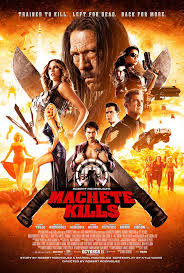
MACHETE KILLS
US, 2013, 107 minutes, Colour.
Danny Trejo, Demian Bishir, Mel Gibson, Amber Heard, Michelle Rodriguez, Antonio Banderas, Cuba Gooding Jr, Lady Gaga, Walter Goggins, Alexa Vega, Vanessa Hudegens, Sofia Vergera, Charlie Sheen (billed as introducing Carlos Estevez).
Directed by Robert Rodriguez.
There is one thing you can say about the Machete series. It does not take itself too seriously. But it takes being deadpan and ironical with the humour quite seriously – and in that way it works successfully. Not that everybody would want to see the Machete films! They demand a fairly macho approach to movies from both men and women in the audience!
Writer-director (and director of photography, editor and co-composer) Robert Rodriguez, Texas-based, has always had an interest in genre films, loving action, but always ready to delve into the shadow side of human nature and present (exploit) human capacity for evil in fairly graphic ways, a Grindhouse imagination (From Dusk to Dawn, Sin City, ). His career has given him freedom to do as he wishes – and that is obvious from his indulgences in Machete and Machete Kills.
The film starts with a trailer of Machete Kills Again – in Space. It looks like a joke, but just see how this plot progresses and how it ends. The trailer is not so implausible (at least in the Machete context).
Then Machete goes into action – in Mexico. This time he has been requested to investigate drug dealings and other crimes. He is portrayed again by Danny Trejo whose gnarled looks (very) make him look mean and meaner, enough to give anyone a fright. Though he can shows his more human side. But, it is Machete in action, even without his machete, that look more like computer games violence than anything real.
There is someone who is after him, but takes different human forms, The Chameleon. Some of the forms include Antonio Banderas, Cuba Gooding Jr and Lady Gaga. And there is a succession of young actresses and Sofia Vergera as a villain.
There is a joke in introducing trouble-prone Charlie Sheen, with his real name of Carlos Estevez, putting him in the role of the president of the United States – jogging audience memories of his father, Martin Sheen, portraying President Bartlett in the television series, The West Wing.
As Machete seeks the drug lord, the films seems a bit James Bondish, larger-than-life villain and tough action. Played by Demian Bichir, he is at one minute a ruthless gangster, the next a respectable agent trying to do his work in dangerous circumstances. But, that is only the half of it. The US government want Machete to track down an arms-dealer. This is even more James Bondish with a Blofeld-like villain, Voz, played by Mel Gibson.
This gets Machete into all kinds of dangers and trying to stop Voz launching into space with a group of wealthy humans who have paid big money to be re-located in space – as well as our hero, like Bond, trying to defuse a nuclear weapon within seconds. Off they go – and we realise the trailer is all too relevant to the adventures of Machete.
It has its violence and gory moments. It has its gross moments. But, with its solemn and, with respect, ugly antihero, a stock of one-liners and a mentality that likes to spoof the conventions it is using, Machete Kills can be listed as one of those guilty pleasures that you wouldn’t like your friends to know about!!
Published in Movie Reviews
Published in
Movie Reviews
Tagged under
Saturday, 18 September 2021 19:47
Adoration/ 2013
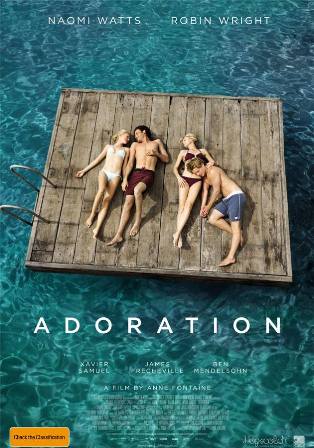
ADORATION
France/Australia, 2013, minutes, Colour.
Naomi Watts, Robin Wright, Xavier Samuel, James Frecheville, Ben Mendelsohn, Gary Sweet, Jessica Tovey, Sophie Lowe.
Directed by Anne Fontaine.
It was too good a phrase not to use: a reviewer-friend remarked at the end of Adoration, “a film of vexatious morality”.
Indeed, the film is a story which raises moral issues. It is too easy and glib simply to note the tagline of two women falling in love with each other’s teenage sons. This is something of what the film is about but does not indicate anything of how the subject is treated. A number of audiences have found the film very romantic. Others have worried about the relationships, the effect on each of the characters, and some have worried about the closeness of the friendships and relationships, even suggesting overtones of incest.
The title of the film, Adoration (previously, Adore) is suggestive of how, during the relationships, each partner sees the other. However, the original title of the film was To Mothers and, indeed, the original title of Doris Lessing’s story is To Grandmothers. Doris Lessing, in her stories, often set in Africa, and was not afraid to tackle troubling situations. Hence, the interest in exploring the characters, friendship, affairs of the two grandmothers.
While the director is French, and Fontaine, the adaptation of Doris Lessing’s novel comes from noted British playwright and screen-writer, Christopher Hampton (dangerous liaison is Dangerous Liaison is). And the setting has been adapted for Australia, the central coast of New South Wales, filmed at Seal rocks, a beautiful ocean location with beaches and cliffs, the atmosphere of a small town.
we are introduced to the two mothers when they are children, playing in the bush and on the beach on the verge of puberty. We are made aware of the strong bonds between the two, sharing everything, the best of friends. as the to look at each other, there is a visual transition to them as grown-up, as mothers, attending the funeral of the husband of one of them. as with the mothers, their two sons formed strong friendships and bonds, the best of friends. And, the same visual change to bring the boys to their late teenage years. Still best friends, surfing, in and out of each other’s houses, ordinary situations. But, there is some tension in one household as a marriage seems to have gone cold, the husband wanting to move to Sydney, to teach at Sydney University, his wife seemingly willing, but this being the last Bond being cut and he moves away.
It seems best to mention here the strength of the performances. Naomi Watts, perhaps a bit more subdued than in her other performances, is little, whose son is Ian (Xavier Samuel). Robin Wright is Roz whose son is Tom (James fresh feel). Ben Mendelsohn is Roz’s husband who moves out. While the performances are strong, Robin Wright’s portrayal of Roz stands out, a complex portrait of a middle-aged woman and her profound emotions.
It is in this context that Ian makes an approach to Roz, Tom resentful when he finds out what has happened, approaches Lill. It is here that many audiences become uncomfortable, though some are vast would the audience be so questioning had the genders been reversed, the younger women approaching the older men. It is still rather unusual to have the younger men approach the older women and to want a relationship rather than merely an affair.
But the film takes a song, two years after the initial beginnings of the affairs. Which gives the film some more substance, on how each of the couples handles the situation, well or not well. There are further complications when Tom goes to Sydney, to work with his father, meats and aspiring actress and all four have to take stock of their situation.
And the complications did not stop there because each of the young men does marry, and has to face whether the marriage is substantial or the initial love is still all-pervasive.
Stories are able to take us into areas which may not be familiar, to characters faced with the moral dilemmas, who do not look to the consequences at the time but are capable of being particularly hurtful. And, adoration leaves us with these questions.
1. The titles of the film: two mothers, Adore, Adoration? The particular focal point?
2. An adaptation of Doris Lessing’s novel? For the screen? For an Australian setting? Lessing’s title of Two Grandmothers?
3. The locations, the beautiful photography, atmosphere, the coastal town, homes, the cliffs, roads, the bush, the sea, the rocks, the service? The interlude in Sydney? The musical score?
4. The introduction to Lil and Roz, young girls, at puberty, the close friendship, their bonds, sharing, best friends?
5. The transition to adulthood, the continuing bonds, the funeral and levels of grief for Lil, Roz’s marriage, her son? The two boys together, friends? The care, Harold urging the boys to go to the beach, their play together? The visuals of the transition to them as older teenagers?
6. The transition to the women, 40-ish, their appearances, fit and trim, their lives, difficulties, relationship with their sons, love? They love for each other and its intensity?
7. Harold and Roz, the relationship with Tom? Harold and his career, the application for the job, not discussing it with Roz, his wanting to go? Her acceptance? Are rationalising the situation? His going to Sydney, his absence? Happy and his return? The collapse of the marriage, his going to Sydney, the opportunities for Tom, the new marriage, loving his wife, devotion to the baby? With Tom, the auditions, Tom’s success? Bringing Mary to the 21st birthday party? His losing his anger for Roz? A new life?
8. The situation, the boys at 18, their friendship, surf, in and out of each other’s houses?
9. Ian and his character, relationship with his mother? His approaching Roz, the kiss, her response? The affair? Tom and his discovery, the effect on him, resentment, approaching Lil, talking, the kiss, laws reaction and response?
10. The situation developing, from affairs to relationship? The effect on each of the women? The discussions? The profound emotional impact?
11. The character of Saul, coming to the office, a suitor for Lil, stopping the car and offering help, his visit, his responding to the suggestion that they were a lesbian couple? Lil and Roz and their laughter at this response?
12. The passing of two years, Ian, his working in the office, with his mother, the continuing relationship, his future, the contrast with Tom, working at the
theatre, his relationship with Lil, his future?
13. Tom going to Sydney, with his father, the auditions, Mary and her song, the impact, the relationship with her, Lil and her suspicions, the affair with Mary, his 21st birthday party, Harold bringing Mary, dancing with her? Leading up to the marriage?
14. Lil, upset, Roz and her strong mindedness, telling Ian to live his own life, being upset and his anger?
15. The 21st birthday party, the dance, with Hannah, the affair, saying he would elbow her out of this life? Her pregnancy?
16. Ian and his blaming Roz? The strong words between them?
17. In the surf, upset, falling, injured, hospital? The aftermath?
18. Hannah, visiting in hospital, the pregnancy, his rehabilitation, their life together?
19. Time passing, their all going to the beach, the grandmothers with their children, the tensions between the husbands and wives?
20. Tom, going to Lil, the continuing of the affair, levels, explanation to Roz? Ian upset? The bluntness of Ian telling the truth about the relationships? Hannah hearing, upset, Mary and Hannah together, taking the children, leaving?
21. The four people on the float, the overhead shot – the opportunity for the audience to reflect on what had happened and wonder about the future?
22. The moral perspectives, behaviour, relationships, betrayal, the hurtful experiences and their consequences?
Published in Movie Reviews
Published in
Movie Reviews
Tagged under
Saturday, 18 September 2021 19:47
Chasing Sleep
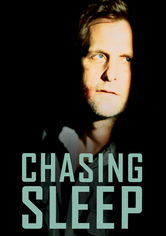
CHASING SLEEP
US, 2000, 106 minutes, Cover.Colour.
Jeff Daniels Molly Price, Gil Bellows,
Directed by Michael Walker.
Chasing Sleep is one of those films where audiences are unsure whether what they are watching is reality, dream, hallucinations or a mixture of all of these. The action is confined to the one house – although there is a sequence in a hospital corridor and room when the protagonist goes through a hole in the wall. He sees his mother dying who threatens him with hell.
He is in some kind of hell. When he wakes, he realises that his wife has not come home from work at school. He suspects her of having an affair with another teacher. He contacts the police, they talk to him on the phone, an officer comes in person, the detectives come to investigate. A psychiatrist also visits him. Further, the man with whom the wife is allegedly having an affair also comes to house and physically attacks him. And there is a university student who has no friends but is devoted to her lecturer and wants to help – ultimately a sexual encounter which may or may not be imagined.
Jeff Daniels gives an interesting performance as the disturbed university lecturer, being present in all the sequences of the film.
It is over to the audience to decide about what they have experienced, reality or imagination.
1. The immediate impact of the film? Tantalising? Sufficient clues as to whether this was reality or imagination? The total effect?
2. The action confined to the house, Ed’s apartment, the different rooms, the basement? Yet the holes in the walls and his moving through into the hospital? The effect of this claustrophobia for Ed and for the audience? The atmospheric musical score, evocative and suggestive?
3. Reality and unreality?
4. Ed waking, the hair on the bed, his absent wife and his concern? The reality of Ed waking, his ordinary activities and encounters, especially with the police, the student, the psychiatrist? His phone calls? Yet, the theory that he had murdered his wife, concealed her in the building, with the clue of the finger, his being unable to get rid of it, in the toilet, its movement down the corridor? His sleep-disturbance because of what he might have done?
5. The background story? His wife, teaching, music, the piano? At school? The relationship with George, the PT instructor? Affair or not, or in Ed’s imagination? Her not returning home after school? Ed cooking the dinner for her? Her car found near George’s house? His not going to the University, the phone calls, his being missed, his angers, unreasonable, his being fired?
6. Ed and his personality, age, experience, work? His concern, his friend ringing? His ringing the police? The initial discussions on the phone? The detective calling in? The detectives coming later? His reaction to them? Generally friendly? Their examining his house, looking for clues about his wife, finding her diary, reading it, upset, keeping it, burning it? His searching in the house, the holes in the wall, his going through, the incident in the hospital, his mother dying and telling him he would go to hell?
7. The university student, her insistence on coming over, bringing the food, the mark for her essay, and not making friends, the bathroom, the blood, his giving her his wife’s jacket? Her leaving? Becoming the second time? Food? His asking her why she put the bloodstained jacket under the bed? Her explanation that she was a loser and did things like this? The seduction, the sexual encounter? Real or in Ed’s imagination?
8. The psychiatrist, his coming to the door, his talking about Ed’s condition, his own experience, insomnia, the tablets, the prescription? Ed asking the girl
to get the prescription? His taking the tablets, saying they did not work?
9. The detectives, the interrogations, his phone off the hook? Searching the room, the jacket, his wife’s diary? His asking them to leave?
10. The arrival of George, his aggression, attacking Ed, the police response, making charges? The car near George’s house? His being in custody?
11. The overall impact of this experience, sharing with Ed, reality or not? If realism, his insomnia leading to hallucinations? Or the whole thing a dream and hallucination?
Published in Movie Reviews
Published in
Movie Reviews
Tagged under
Saturday, 18 September 2021 19:47
Right Cross
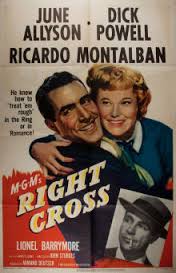
RIGHT CROSS
US, 1950, 90 minutes, Black and white.
June Allyson, Dick Powell, Ricardo Montalban, Lionel Barrymore, Tom Powers, Larry Keating, Kenneth Toby, Marilyn Monroe.
Directed by John Sturges.
Right Cross is a small-budget MGM film of 1950, directed by John Sturges who would go on to make some significant films like Bad Day at Black Rock as well as many action films like The Hour of the Gun, The Magnificent Seven, The Great Escape, The Eagle Has Landed.
The film is a star vehicle for June Allyson, one of the top actresses at MGM at this time, especially in musicals and comedies. It is a star vehicle for Dick Powell who had been a song and dance man at Warner Brothers in the 1930s, a hard-boiled detective in many film noir of the 1940s. He also moved into direction. While Ricardo Montalban had appeared in a number of Mexican films in the 1940s, he went to Hollywood, allegedly in the tradition of Rudolph Valentino, and was an instant success at MGM in the film, Fiesta. He would have a long career in film and, especially, television and Fantasy Island.
The film has standard boxing sequences, both training and bouts. It is also a romance with June Allyson in love with Ricardo Montalban but continually clashing with him. In the background is journalist Dick Powell who loses the girl in the film but actually married her in real life! And there is a very brief scene, yet quite striking, with Marilyn Monroe.
1. An MGM film of the 1950s, cast, black and white photography, sports and romance?
2. The focus on boxing, Johnny and his fights, champion, the promoters, the journalists, the challenges? The world of sport?
3. The film as a romance, Johnny and Pat, the ups and downs, Rick and his friendship with them both, his love for Pat, matchmaking, making reconciliations, standing back?
4. The boxing sequences, the training, the ballots, the final and Johnny being knocked out? Boxing scenes for fans?
5. Pat, her being a promoter, daughter of her father, her love for him, his career in promotion, ill, confined to a wheelchair, not allowed to smoke but defying it, at the end of his career? His dislike of Johnny, especially as a Mexican? Not wanting Pat to marry him? Her arguing with him? Rick and his visits, discussions, the smokes?
6. Pat, June Allyson’s screen presence, her figure in her job, a relationship with her father, a love for Johnny, their continually falling out, her being hurt, a concern about his career, his hand, wanting to marry him? Johnny not proposing? His wanting to change contracts? The build-up to the dinner, his explanation of himself, her being upset, going to Rick? Falling back on his support? The final fight, Johnny losing, her telling him that she loved him not just his being the champion? The happy ending?
7. Rick, newspaperman, his contacts, the out-of-work journalist with the tips, giving him the final information about the flight? His love for Pat, continually standing back, making excuses for Johnny? The clashes with Johnny, even to Johnny hitting him? His standing aside at the end? His flirtatious behaviour, the promise of spaghetti, not being able to cook it? The brief scene with Marilyn Monroe?
8. Johnny, Mexican, the influence of his mother, her criticism of the gringos, yet his love for Pat, not taking her to meet his family? His sister, the boyfriend and Johnny ousting him? His wanting to be champion, Mexican champion? Speaking Spanish at home? Wanting to beat the gringos? And the scene where his opponent referred to him as a greaser? The practice, injuring his hand, the doctor and his telling the truth, his concealing this except from his agent? The offer for a better contract? His loyalty to Sean? To Pat? Meeting with the other agent and the possibility of a deal, security for his future? His determination to win, self-confidence? Rick telling him he would lose? The fight, the knockouts, his losing? The aftermath, confrontation with Rick and hitting him? Relying on Rick to fix everything up?
9. The family, the strong-minded mother, Rick and the rumba with her, her attack on gringos? The sister and her being hurt by Johnny?
10. The world of agents, journalists, tipsters?
11. A satisfying popular blend of boxing and romance?
Published in Movie Reviews
Published in
Movie Reviews
Tagged under
Saturday, 18 September 2021 19:47
Fixed Bayonets!
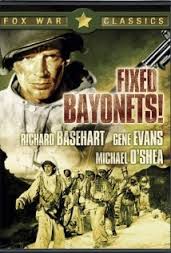
FIXED BAYONETS!
US, 90 minutes, 1950, 90 minutes, Black and white.
Richard Basehart, Gene Evans, Michael O’ Shea.
Directed by Samuel Fuller.
Fixed bayonets! Is one of two Korean war films made by Samuel Fuller at the beginning of his career, the other being Still Helmets. during the 1950s, Fuller made a number of strong social-minded films, including at this time, pick up on South Street. he made many genre films, ranging from westerns to dramas set in Asia.
1. He continued this career during the 1960s and 70s, climaxing in his very personal film about World War I and World War II, The Big Read One, with Lee Marvin.
2. A career in film made while the war was being waged? A sense of the period? Korea, China, American involvement?
3. American military involvement overseas, in the aftermath of World War II? The experience? Americans fighting in Asia?
4. Samuel Fuller, his work as a writer-director? Small-budget films? Tough and direct?
5. The film using the conventions of the war film, the focus on a particular platoon, their camaraderie, working together, the dangers, heroism, men dying, others surviving, helping?
6. The opening, the explanation of the situation, the maps, the weather and snow, the massing of the Korean troops, the plight of the Americans, the need to retreat? The possibility of retreat, and the squad protecting the rear of the retreating men?
7. The tough men, the general, his arm and the injury, his focus on the situation? The meeting of the advisers, the contact with headquarters? The decision to be made?
8. The selection of the men? The commanders? Gathering the group?
9. The retreating group, going through the snow, to get to the bridge, the crossing?
10. The focus on the leader, his role with the group, his personal leadership, less confidence but gaining confidence, interactions with the men? The different personalities? The leaders?
11. The presentation of the Koreans, their skills, strategies? The soldier walking into the trap, his being shot? The consequences?
12. The pursuit by the Koreans, the Americans taking stands? The deaths?
13. Coming back to the main group, the leader and the surviving men, the sudden appearance of the men who they thought had died?
14. A strong sense of patriotism? But no softening of the experience of war?
Published in Movie Reviews
Published in
Movie Reviews
Tagged under
Saturday, 18 September 2021 19:47
Spectacular Now, The
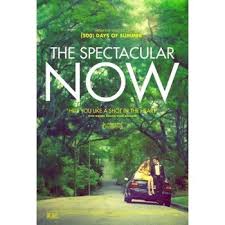
THE SPECTACULAR NOW
US, 2013, 97 minutes, Colour.
Miles Teller, Shaileene Woodley, Brie Larson, Jennifer Jason Leigh,
Directed by James Ponsoldt.
The opening of The Spectacular Now shows us the central character, Sutter (Miles Teller) at his computer, typing an essay on something that was hard and challenging in his life as part of his application for college. He recounts his exploits of the night before, with flashbacks indicating to the audience something of his character, his partying, his relationship with Cassidy (Brie Larsen) the glamorous blonde beauty of the class. He also starts to tell something of the truth about himself but deletes the letter.
As the film takes as into those high school parties, loud, dancing, drink… teenagers and young adults may get excited by this, while older audiences may slip back into their seats and wonder what they are going to be asked to endure. However, the film does improve both for its target audience as well as for those who may not be drawn into it immediately.
Sutter is 18, in the final year at school, not particularly interested in classes, full of wisecracks, considered something of a clown by others at the school. At this stage we are not sure that he has anything more to his character.
The Spectacular Now obviously means living to the full in the present, relishing it, glorying in it. At least, this seems to be the philosophy of Sutter. But Sutter, living in the now or in the immediate past, partying, drinking, trying to make an impression on his girlfriend, Cassidy, and generally failing.
As with so many films, all films really, we need to wait until the end to see how the situation develops and whether it resolves itself. This is particularly the case with The Spectacular Now.
The film is Sutter’s story. He lives with his mother, separated from her husband, working on night shifts in a hospital. This gives Sutter plenty of time to indulge himself, with Cassidy, with his best friend whom he is trying to set up with a girl, making wisecracks which he discovers later make him seem like a clown to his fellow-students. And he drinks, often and strongly, with his concealed flask. What is to happen to Sutter, especially as he deletes the application for college?
The main crisis of the film is Sutter, drunk, disappointed, driving home and crashing his car, and waking up at 6.00 am with a fellow-student looking down at him on her lawn. She is Aimee (an impressive performance from Shailene Woodley, a rather unprepossessing young woman, dominated by her mother, even to doing her mother’s paper delivery route. But, Sutter and Aimee unexpectedly click. She falls for him, he is comfortable in her company but does not see it as a loving relationship.
It is interesting to see the development in Sutter despite himself, becoming a more normal person, not just simply joking around, but really interested in keeping Aimee company. But he doesn’t stop drinking, actually enticing Aimee herself to start drinking.
He is challenged by a lecturer to improve his geometry studies, and he asks Aimee to tutor him. This gives them the opportunity to be together, for him to learn something about her (a love of reading graphic novels, for instance) and for him to be more himself.
He has never known his father and his mother will not give him address or phone number to make contact. He dares Aimee to stand up to her mother (using language she never would have dreamt she would use) and she dares him to find out about his father. Eventually he does and asks her to go with him, an experience that he has been looking forward to but which, inevitably, ends in disappointment and anger. And he also asks Aimee to go to the prom with him. He becomes a changed young man, even when, in times of retrenchment, his boss wants him to stay on with his part-time job, asking him to give up drinking; he is honest enough to say that he cannot.
There is a strong scene towards the end when he begins to talk honestly with his mother and she talks honestly with him, not reprimanding him, but pointing out all his good qualities which he covers with his low self-image.
The film is clearly a moral fable, especially about being one’s true and genuine self, not setting up a facade image, as well as in developing a sense of responsibility – and knowing that there can be a spectacular now another tomorrow, the next day, and…
1. Acclaim for the film? The target audience: teenagers and young adults? Impact for middle-aged audiences? Older audiences? Parents?
2. The title, Sutter and his philosophy of living in the present, his later discovery of the importance of the now and living it fully, with many nows to come?
3. The film is a moral fable? Sutter and his life, experiences, low self-image, change, maturity? Issues of responsibility and life?
4. The opening, Sutter typing the letter, to the dean, the topic of the essay, something hard and challenging in life, his writing about the night before, his relationship with Cassidy, his experiences and disappointment? Deleting?
5. The introduction to Sutter, his age, at high school, his life of partying, his wisecracks, confiding in his friend, wanting to fix him up with the girl, his relationship with Cassidy, her glamour, she seeing him as a friend, the sexual encounters, her lack of commitment to him? Her boyfriend, the jock in the high school, the attack? His reaction? Prospects?
6. Sutter’s mother, a hard woman, asking him to do things in the house, her work as a nurse, the many shifts, her attitude towards her husband, Sutter sometimes like him, not allowing him to contact his father?
7. Sutter’s sister, her marriage, wealthy husband, success, not having to do any work, her pampered life and her dissatisfaction? The meal, the discussions with Sutter and Aimee, her giving her brother their father’s address, the end and the family having a meal together?
8. Sutter, his drinking, continually, his flask, at work, his boss confronting him, having to sack him unless he reformed, his saying that he could not change, his honesty?
9. The night out, driving the car, recklessly? The police watching him? Collapsed on the lawn, Aimee and her approach? the paper route, her mother and Aimee doing it for her mother? His help, throwing the papers, his good arm?
10. The teacher, calling him to task about his attitudes, geometry? The classes? Papers and grades? Sutter later confronting the teacher, asking whether he was happy in his life? The hesitation?
11. Aimee, her reading, the graphic novels, at the party later and the bond with the man discussing these with her? Her knowing geometry? Willing to tutor Sutter? Their being together, comfortable together? The school corridors? The constant comment by Sutter’s friend?
12. The genuine love, gradually falling in love but Sutter’s not knowing it, enjoying her company, talking with her?
13. The school jock, his approaching Sutter in the shop, Sutter giving him good advice?
14. Daring Aimee to confront her mother, to go to college, giving her the swearing facilities to do this? Aimee reporting that she had done it?
15. Sutter, not confronting his mother, Aimee daring him? Asking his mother for his father’s address, his sister, giving the phone number, the phone call, the invitation, his taking Aimee with him? Finding his father, his character, the woman giving him looks in the bar, his friends in the bar, his drinking, talk? Talking with his son? About the marriage, in love, infidelity, not being proud, his decision to leave? His memories and Sutter’s memories? Throwing ball? Childhood? His asking them to wait for an hour? Not coming back, their seeing him in the bar? Leaving?
16. Sutter, his driving, his anger? Aimee and the crash, his arguing, her concern about him, his irritation, her getting out of the car, being hit, in hospital?
17. With Aimee, inviting her to the prom, the drinking on the way, his suit, her dress, his seeing Cassidy at the dance, dancing with her?
18. His decision not to graduate? The transition to the graduation ceremony, Cassidy coming to him, her talk, the bond between them, his being her best ex-boyfriend?
19. Aimee, the gift of the flask? Going to college, Sutter encouraging her, not going to the bus to see her off, awaiting, his watching?
20. Sutter and his mother, the confrontation, the strong talk, saying he was lovable and kind, getting to look at his own self-image?
21. His taking stock, writing a new letter to the dean, going to the university to meet Aimee?
22. The final moralising, love, being true oneself, responsibility, and the spectacular now? And future nows?
Published in Movie Reviews
Published in
Movie Reviews
Tagged under
Saturday, 18 September 2021 19:47
Enough Said
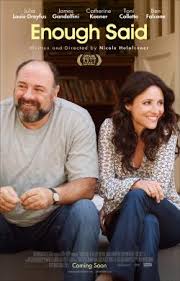
ENOUGH SAID
US, 2013, 92 minutes, Colour.
Julia Louis- Dreyfus, James Gandolfini, Catherine Keener, Toni Collette, Ben Falcone.
Directed by Nicole Holofcener.
A film of great feeling – and feelings. This is a film for middle-aged and older audiences, characters they can be interested in, identify with in some ways, puzzle about their relationships, their handling of situations and crises. It may also be interesting for young adults who are sympathetic with their parents, perhaps puzzling over decisions they make, wondering what it is like to be 50 plus or minus.
The film has an inbuilt sympathy factor for those who know the actor James Gandolfini and his work, especially his central role in The Sopranos. He died unexpectedly of a heart attack at the age of 51 in 2013. This is his second last film.
The focus of the film is on Eva, a woman divorced for 10 years, with a daughter who is about to leave home for college. She works as a masseuse and we are introduced to her as she goes on her rounds, working with a cross-section of people, with their personal oddities, like bad breath, incessant chattering, a young man to whom it doesn’t occur to help the masseuse up the staircase with her table. At a party, she meets a woman to whom she gives a card and who later rings her for an appointment. She also meets a middle-aged man, overweight, pleasantly genial, who rings her to make a date.
Eva, the masseuse, is played by Julia Louis- Dreyfus, best remembered by older audiences for her role in the long-running television series Seinfeld and the current series, Veep. She may not be the brightest star in the firmament, but she is a sympathetic woman, doing her work, helping people, reaching out to a daughter, to her daughter’s best friend (which leads to some envy), making do with life as well as being disappointed in the failure of her marriage.
Albert, who begins to date her, is played with great sympathy by James Gandolfini, perhaps unexpected because of his best-known gangster role. However, he is a genial man, slightly embittered by the rejection of him and the constant criticism by his ex-wife (Catherine Keener). The ex-wife is the woman to whom Eva gave her card at the party. Which means some complications for Eva, especially when she becomes aware of who Albert is.
There are some amusing situations, some humorous lines, but above all, a strong rapport between Julia Louis-Dreyfus? and James Gandolfini. There are also some telling sequences as each couple has a daughter going to college.
In the background is Eva’s great friend, Sarah (Toni Collette with her Australian accent!) And her husband, played by Ben Falcone, with whom she is constantly sparring. Is this what marriage is really like!
There is gentleness and warmth in the treatment by writer-director, Nicole Holofcener, who, over the years, has made a number of brief and gentle films about relationships and, especially, about women and their lives and issues (Friends with Money, Please Give).
1. A pleasant and pleasing film? For older audiences? Middle-aged and older? Relationships, love? In a contemporary setting, the world of values and confused values?
2. The cast, playing against type? The screenplay, its humanity, humour, charm, challenge, all with the light touch?
3. The ordinary setting, the American city, homes, streets, Eva and her jobs, restaurants…?
4. The different generations? The parent generation, the children in their late teens and going to college, leaving home? The reactions and wanting to begin life? The parents and their regrets?
5. Themes of marriage, divorce, breakup and reasons, the consequences, the effect on the children? The parents sharing the children? Loyalties?
6. Eva’s story, her age, 10 years divorced, love for Ellen, her job as a masseuse, a range of clients? The man with the bad breath, the woman who talked incessantly, the young man who never thought to help Eva with her table up the steps? Their recurring appearance? The man eventually helping?
7. Eva, her friendship with Sarah, their chats, on Skype, sharing ideas? Sarah and her husband, continually criticising him, the children, the continually changing the furniture? Going out, the party, in the car, talk, the meal to meet Albert?
8. The party, Eva and seeing her client, meeting Maryanne, their talk, giving her card, the follow-up? Meeting Albert, the exchange of banter?
9. Eva and Maryanne, the massage work, their talk and friendship, a beautiful house, her being a poet, the gift of the book, the discussions, Maryanne having few friends? The continued criticism of her ex-husband? The relationship with her daughter? The talk with Eva, Eva’s gradual realisation who the ex-husband was?
10. Albert, his age, size, manner of speaking, genial? The date, the meal and their comfortable talking, frank, at ease, continued outings, going to the movies, Albert not being able to whisper quietly? His cooking his favourite meal? Love, together, the affair, the result for each of them? Ellen not meeting Albert? But Chloe at home, having the meal with Albert?
11. Eva, going to the dress shop, Chloe and her mother wearing the same dress, her knitting, the discussions with Chloe about sexual behaviour, later supporting Chloe, her mother’s anger with Eva and taking Chloe away? Eva and her mothering Chloe, conversations, offering her to stay in Ellen’s room, Ellen and her envy?
12. Albert, meeting Sarah and her husband, their talk at the table, men’s view?
13. Eva, stirring Albert, the discussions at table about the whisper, the effect on Albert, his driving her home?
14. The effect on each of them, the tension?
15. The visit to Maryanne, meeting Maryanne’s daughter, the recognition, Albert turning up, the tension and Eva’s apology? Maryanne’s amazement? The daughter reassuring Eva that her father really liked her?
16. Driving past the house, Albert saying that Eva had broken his heart? His seeing her, getting out of the car, the sitting and talking, re-establishing the bonds? A foundation for love?
17. A film about opportunities, needs, fulfilment?
Published in Movie Reviews
Published in
Movie Reviews
Tagged under